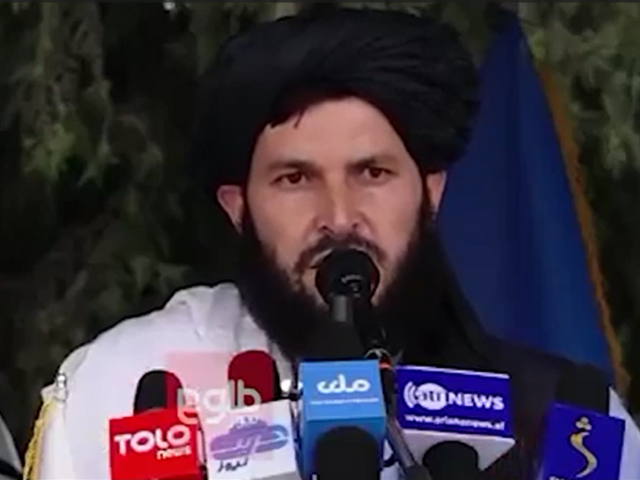PESHAWAR:
A senior Taliban commander said on Wednesday that militants who engage in combat in a foreign country without the amir’s authorisation are not justified in doing so, adding that such individuals cannot be regarded as mujahideen or jihadis.
This was stated by Saeedullah Saeed, a senior commander at the Hazrat Hamza Military Academy, during a graduation ceremony for 400 police personnel in Kabul.
“Those who defy the orders of Amirul Momineen Mullah Hibatullah Akhund and go to fight beyond the borders of another country (without naming Pakistan) are not justified and are disobeying the amir’s orders,” Saeed said.
“Individuals who affiliate themselves with one group or another to engage in jihad in a foreign country are not considered mujahideen or jihadis,” he added.
This marks the third time that Amirul Momineen Hibatullah Akhund has directed all followers and communicated to commanders along Pakistan’s western border that any jihad undertaken without the decree of the Amir or the Council of Ulema is considered fasad (illegal or corrupt).
The message came following a drone strike in Janikhel, Bannu, Khyber-Pakhtunkhwa on Tuesday, which killed over 70 militants. Post-strike investigations revealed that more than 30 of the casualties were Afghan nationals, a source added.
Following the incident, Islamabad sent a stern message to Kabul, warning that if cross-border recruitment was not halted, the repercussions would be more severe, the source added.
The message from Amirul Momineen was conveyed to all military commanders along the Pak-Afghan border. A recent Tashkeel (a large Taliban formation) was successfully thwarted, and several recruiters were arrested in the provinces of Khost, Paktika, and Paktiyacollectively known as Loya Paktiya or larger Paktiya, the stronghold of the Haqqani Network.
This was the second time such measures were implementedfirst after Pakistan’s Defence Minister Khawaja Asif visited Kabul, and now following the recent visit of Chinese and Pakistani delegations, the source said.
“A total of more than fifteen recruiters were arrested, including individuals who were part of the Tashkeel,” a provincial source added.
According to the source, the message delivered by the senior commander at the Hazrat Hamza Military Academy was of a highly important nature, directed at all those who would be at the helm of affairs.
The message came at a time when a tripartite meeting between Pakistan, China, and Afghanistan is scheduled to be held in Kabul in July.
Is China a bonding force
Haq Nawaz Khan, a senior security analyst and journalist with The Washington Post, told The Express Tribune’s Peshawar office that “China is the bonding force behind easing tensions between Islamabad and Kabul, while regional realignment, development, and the success of CPEC projects are closely linked to the security of the region.”
Haq Nawaz Khan explained that multiple threats rooted in Afghanistan extend beyond the TTP, including groups such as Hafiz Gul Bahadur, ISKP and the Turkistan Islamic Party (formerly known as the East Turkistan Islamic Movement), which is known for its expertise in drone technology. He added that this group has reportedly supplied drones to the Baloch Liberation Army (BLA) and Balochistan Liberation Front (BLF), whose union is also referred to as BRAS. Additionally, various Baloch nationalist forces, including the BLA and BLF, maintain links to Afghan soil.
The TIP was known for providing drone technology to the TTP. The BLF was also among the recipients whom Islamabad has asked to be restrained. TIP is also reportedly behind the supply of laser technology and thermal engineering systems to both TTP and Balochistan liberation forces, The Express Tribune has learned.
If China were not supporting the unusual alliance between Islamabad and Kabul, the Qandharis would have allied with Iran and others, while the Haqqani network would have aligned with the UAE and Saudi Arabia. However, Beijing has severed all such ties for now, he said.
Projects for Afghanistan
The source revealed that upcoming rail and road initiatives include a railroad connecting Hiratan to Parachinar and Kohat, which will link to the existing Chinese-backed Karachi to Peshawar route.
“During the Chinese negotiations, Mullah Hibatullah requested that the railroad also be extended to southern Afghanistan, linking Kandahar and Herat provinces, which were considered part of the project,” the source added.
The existing Kabul-Jalalabad road via Mahipar will be replaced by a highway connecting various eastern provinces, while another highway will link Kandahar to Kabul, and a third will run from Kabul to Mazar-e-Sharif, the senior official said.

